#but i personally love it; Emma. 2020 decided that the upper-class and well-to-do characters are comedic
Explore tagged Tumblr posts
Text
Thinking about the dance scene in Emma. (2020) and once again, really admiring the choreography and cinematography, because after watching it the first time, I had no idea why it was as compelling and intimate as it was, but I could tell it was.
The obvious thing going on in the scene is the fact that neither Emma nor Mr. Knightley are wearing gloves, while everyone else is. However, the way this emphasis is conveyed is more subtle than just zooming in on their hands, though that helps. The choreography of the dance emphasizes a few things: hands, approaching, and then withdrawing. So there’s one early-on moment where the characters approach each other and hold up their hands without quite touching, and then withdraw. The choice was made to have the couples withdraw in turns, so while one couple is close, the others have pulled back, which allows for an alternating focus on Emma and Mr. Knightley. If you didn’t catch the gloveless thing the first time, you see it happen again, which helps the message sink in.
I don’t have the knowledge or trained eye to know what’s happening with the camera work, but it works very well.
Then, there are moments where all of the dancers put a hand together and turn. This is the first time it’s clear that everyone else is wearing gloves, so the first time we’re given that information is part of the “withdrawing” or “distancing” part of the dance, so it’s not super in-your-face (which. 2005 P&P is fun but it’s also not trying to be subtle). By the time it’s clear that this is not just an Emma or Knightley thing, but an Emma and Knightley thing, the characters themselves are beginning to cotton on to what’s happening.
Like I mentioned earlier, I didn’t even notice the gloves thing happening in my first watchthrough, but I subconsciously picked up on what they were getting at. I really appreciate that you can pick up on subplots in the dance if you’re looking for them (e.g. Harriet’s blissful, delightful smile and stare the whole time), but they’re also very second fiddle to the main event going on.
I don’t think this is unique to Emma., but I do appreciate their look of concentration the whole dance. There’s one moment where they both sort of notice what’s happening and lose rhythm of the dance, then rush away without leaving-leaving. Then they have to confront each other again, which feels much more appropriate than one moment of “ah, we get it now and we’re both okay with it.” After realizing what’s going on, they now have to live with that knowledge. After the dance is over, they just kind of stare at each other (and it’s really quite funny to me, because they give each other a very intense look but they’re also both a bit bothered. Like, “him?” or “her??” Really quite funny.)
#emma 2020#look i know a lot of people didn't enjoy how comedy was used in emma esp. in the proposal scene#but i personally love it; Emma. 2020 decided that the upper-class and well-to-do characters are comedic#while it treats the less well-to-do but still in the same social circles as the upper class seriously#and there's a major turn as the movie goes on where characters like Miss Bates or Harriet are no longer fair game as comedic targets#whereas emma and knightley in particular get more ridiculous around each other throughout the show#but their serious moments are primarily about how they interact with people like harriet or miss bates#so apologies are treated with extreme solemnity but proposals get ridiculous#the dance is so intense (and allowed to be intense) because they fall for each other by recognizing the good in each other#and the good in each other *is manifest* in how they treat other people. it's also the biggest issue they had with the other#so when they have both reached their moment of awareness of their flaws and each others strengths and shared that with each other#(expressed in how they relate to other characters and especially those in less privileged social positions)#that's when they fall for each other#personally i just think it's funny for them to be slightly horrified to realize they're in love with each other#and then they spend a good deal of the movie denying what's going on#so i absolutely love the ridiculous proposal scene where they're incoherent and can barely convey what they want to#because they're portrayed as characters who are very self-possessed &/or very aware of propriety#and the fact that they can't hide behind that and know each other at their worst is exactly what makes their relationship intimate#it's not exactly a wish-fulfillment fantasy moment where you can imagine yourself in one or the other's shoes#but it is very in line with how emma and knightly function as comedic figures and i guess foils to the other throughout the movie#it also takes place right after one of the most cutting moments in the film where Harriet has revealed that she likes mr. knightley#but emma has never even considered the possibility that they might be fitting and reveals an uglier part of herself#except at this point emma is aware of the fact that she's prone to mistreating social inferiors and has tried to improve from there#and is also devastated to realize that this can't work out neatly anymore (because who is she to deny harriet's aspirations)#and yeah it kinda sucks to realize you've been setting your friend up and encouraging them to socially climb#but that you're not okay with them taking what's yours. and she never fully acknowledged harriet's desires or personhood earlier in the film#she thought of her as someone to be shaped and ruled more than an independent person with her own dreams and feelings#but now she has to confront the fact that she treated her poorly and she wouldn't even begrudge her mr. knightley#except for the fact that Emma herself (for all of her insistence otherwise) actually wants him#BUT on the surface it looks like she's been keeping him to herself the whole time which she actually has not
6 notes
·
View notes
Text
The Critique of Manners: Part III
~Or~
A Somewhat Indecisive Review of “Emma” (Miramax, 1996)
I have a feeling this review is gonna be a little harder for me to write. Everyone knows that recaps and reviews are most entertaining when the writer has an intense dislike (or intense feeling of any kind) for the drama they’re reviewing. It falls to other writers to pan or praise this film as they will, but I simply don’t have many particularly strong feelings about it at all. I have neither that repulsed dislike for this movie such as I did for Emma 1997, nor that disappointed frustration as for certain aspects of Emma. 2020, but neither do I have a deep, profound love and appreciation for it as I do for Emma 2009.
Written and Directed by American Screenwriter, director and actor, Douglas McGrath, Emma (1996) is rather what one expects it to be: a 90’s romance film. Perhaps it’s because I had expectations due to the era in which it was made, but I think I have a tendency to excuse some of the problems with this film. There are many unnecessary additions (for comedy’s sake usually and often quite cringe-y) and one definitely can’t claim that the dialogue hasn’t been tampered with. I don’t normally side with the “I do so miss Austen’s biting wit” crowd but, by ‘eck I felt it this time. That’s because Austen’s Biting Wit™ just doesn’t suit a fluffy 90’s chick flick (which this film is in a way that other big screen Austen adaptations of the time just aren’t – and I think approaching this film from the 90’s chick flick perspective is probably the best way to digest it.) This version, more than any other (except perhaps 2009) brings the concept of Emma-as-Matchmaker to the fore with a particular emphasis precisely because it’s a concept that fits well with the rom-com style of filmmaking used here.
The bones of this review, like my review for the ITV version, were written six years ago following my initial viewing only a select number of portions survive from that review (which is still on IMDb).
As with all my reviews I'll be comparing the script, characterizations and plot to the book and commenting on the authenticity and attractiveness of the costumes, and suitability of the houses and sets.
Let’s dive in.
Cast & Characterization
Emma is arguably the easiest of Austen’s works to read because of Emma’s generally good (if condescending and overly self-confident) character, and Mr. Knightley’s sober, mature but exceedingly pleasant manner. I had my doubts about Gwyneth Paltrow playing an Austen heroine, but I at least had faith in Jeremy Northam’s ability to portray the mature Mr. Knightly. My expectations were not entirely disappointed in either case.
My prevailing feeling about this film is that it’s not so much set in Jane Austen’s Regency England, but in an American fantasy of what Regency England was like. Perhaps the biggest factor that reinforces this impression is (of course) the casting choice for our leading lady, Gwyneth Paltrow.
Freckled, ruddy and thin as a twig, Gwyenth didn’t quite, to my mind, fit the physical description of Emma, who is supposed to be “The picture of health” according to Mrs. Weston. Add to this the Regency beauty ideal of a soft and shapely figure with regular features. Fair hair was generally preferred (and I have always imagined Emma as blond, although I’m given to understand that Austen’s idea of pretty generally favored dark hair), so I can’t fault Gwynnie there. What I can fault though is her so-so British accent.
I recently learned that the reason McGrath thought Paltrow would be a good choice was because she’s the only Texan he’d ever met who’d managed to entirely throw off her native accent; I guess he decided that if she could do that she could do any accent work? I guess? Seems questionable to me.
You know Joely Richardson was considered for this part? Gorgeous, refined (British) GODDESS Joely Richardson was passed over because Gwyenth managed to shake an embarrassing accent.
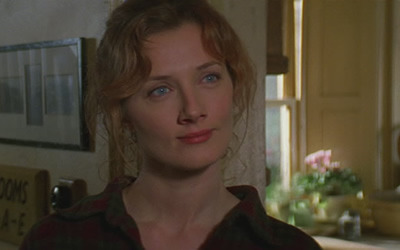
I hate American directors.
I’m not sure if it’s just part of the accent, or her attempt to sound upper class, but on this most recent re-watch it hit me for the first time how very nasal many of her line deliveries are. She also has this problem with looking (and sounding) sort of vapid and… just what is happening here?
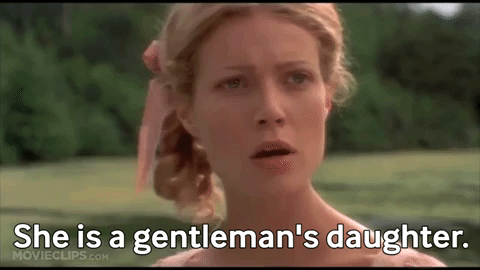
Is she having a stroke at the end there?
A bigger problem than Emma’s casting, however, is her characterization.
Part of the above mentioned script tampering is in lockstep with some of the issues with Emma’s characterization here. Her very teenager-esque swings from vowing to never make another match again to immediately trying to think of another guy to set Harriet up with, and her getting carried away in potential scenarios “But if he seems sad I shall know that John has advised him not to marry Harriet! I love John! Or he may seem sad because he fears telling me he will marry my friend. How could John let him do that? I hate John!” (Especially when you never even really get to meet John Knightley in this version? Ugh, pass me with this shit) is so bizarrely childish it’s a little hard to stomach. She spends the movie going back and forth between mature and manipulative to childish and naïve and it just… doesn’t work for me. Emma can be all of these things but the transition from one extreme to another here seems a bit disjointed to me.
Knightley was a bit of a disappointment to me in this version. That’s not Jeremy Northam’s fault because I can’t think of a better choice they could have made. McGrath showed much better judgment with his choice for Mr. Knightley than he did with Emma.
My biggest problem with this interpretation was how laid back he was when he was supposed to chastising Emma. Their quarrels became more like mere disagreements so the proposal line of lecturing her and her bearing it as no other woman would have isn’t entirely earned. Even in the big scene at Box Hill where Knightley is really supposed to lay into Emma, he starts off pretty solidly, but by the end so doe-eyed and apologetic it fails to deliver the sting of rebuke that is Emma’s biggest learning moment in the story. Perhaps they were trying to go for a more disappointed feel (the kind that makes you feel worse than being shouted at because you really respect the person you let down) but it just didn’t come through for me.
Also of note is the fact that, (I assume) because John Knightley isn’t really allowed time to be a character in this film, McGrath took some of John’s introverted tendencies and transplanted them into his more convivial older brother (“I just want to stay home, where it’s cozy.” – I mean I feel that, but this isn’t something George Knightley would say.)
Onto the less central characters
I question also the choice of Toni Colette for Harriet Smith. I mean I actually liked her performance more on this watch than previously but I just don’t think she’s pretty enough for Harriet, and she looks a bit clumsy (though that might have more to do with her costumes.)
I also noted that McGrath bumps Harriet’s comprehension skills up just a scooch. Emma never has to explain the “Courtship” riddle to her, Harriet figures it out on her own after a while, while she never manages to in the book.
Now we come to the crux of Jane Fairfax, played by Polly Walker. I don’t care for this choice. My issue is the simple fact that she just isn’t believable to me as a demure, wronged character like Jane Fairfax. Seriously she looks like she would sooner throw Frank across the room than take his cruel teasing, and not in the subtle way that Olivia Williams managed to. They never even utilized her by including some of Jane’s more pointed returns to Frank’s jabs, which they even managed to squeeze into the massively cut down TV movie.
Speaking of Frank; Ewan McGregor, though generally delightful, was so under-used. Frank and Jane’s plotline always kind of gets shafted in Theatrical release adaptations of this story. It’s not as bad here as it is in say, the 2020 adaptation (they were in that version so little I actually forgot what their actors looked like), but it’s still pretty stunted.
I find it interesting that Ewan McGregor himself thinks his performance in this movie isn’t good; and I’ll agree it’s not his best (certainly it’s no Obi-wan Kenobi) but I thought he did a pretty good job with obviously unfamiliar material
Also if the Davies screenplay of ’97 made Frank’s character too caddish, I think this version didn’t make him caddish enough. I mean he’s hardly around enough to really develop his flirtation with Emma, and they merged Strawberry Picking and Box Hill into one sequence so we never see Frank’s ill humors. I can perhaps excuse this, since it seems like a nuanced story really wasn’t what McGrath was going for here, I think. This is a lite version of the story; schmaltzy fluff for teenage girls’ movie nights. Frank’s ill humors wouldn’t really have fit the tone of this version at all.
Interestingly enough, though it’s taken me a long time to make this decision, I think Alan Cumming might be the definitive Elton? He’s the only one who doesn’t immediately read as a slime ball from the get go. I mean he’s got all the warning signs that Austen wrote into him, but no more than that. He’s not slinking about greasily or obviously pandering (at first), so Emma’s uneasy realization of what’s really happening here isn’t a hundred miles behind the viewer’s (maybe just fifty).

There are as many Mrs. Eltons out there as there are adaptations of this story, and they’re all pretty great (funky accents aside), but other than the 1997 take, this one might be the least great to me. She’s not nearly pushy enough, because Mrs. Elton would never let Emma prompt the conversation when she could do it herself.
Also, I think McGrath misunderstands Mrs. Elton’s brand of New Money vulgarity. He has her talking with her mouthful, clanking her utensils on her plate as she eats, putting biscuits which she’s bitten into back onto communal plates, which I think even Mrs. Elton would know not to do. Table manners are pretty basic; the couth that Mrs. Elton lacks is of a more nuanced social kind – for instance, what is and isn’t considered gauche to talk about (like how big one’s brother in law’s house is or how many horses he keeps.)
(A sudden thought has just occurred to me: is Mrs. Elton just a more mean-spirited Hyacinth Bucket from Keeping Up Appearances? “It’s meh sister, Mrs. Suckling! That’s right, the one with an estate in Warwickshire and the two barouche landaus!”)
Sophie Thompson’s Miss Bates is chatty and one of better takes on the character, but lack of necessary background hinders her impact on Emma’s story. The comedy in her scenes is some of the best and actually made me laugh, although I think she was just way too giggly.
Miss Bates’s mother, Mrs. Bates, is played by Sophie Thompson’s real-life mother Phyllida Law in a completely coincidental quirk of casting. (I noted in this film how very much Emma Thompson, Sophie’s older sister looks like their mother.)
My only other serious issue with characterization in this adaptation is the representation of Mr. Woodhouse. He is somehow simultaneously more cheery and more disagreeable than he is in the book. His chiding about the cake at the Weston’s wedding seems more like a scolding rather than an anxious admonishment. In one of the first scenes, during Mr. Woodhouse’s “Poor Miss Taylor” speech, he says he cannot understand why she would want to give up her comfortable life with himself and Emma, to have “mewling children who bring the threat of disease every time they enter or leave the house,” and he says this IN FRONT OF ONE OF HIS TWO DAUGHTERS.
Of course in the book, Mr. Woodhouse does lament Miss Taylor marrying, leaving and even having children – but this is all in the context of the danger childbirth presents to Miss Taylor (And the fact that he can’t stand losing a companion). These are his complaints – not the children themselves. In addition, his elder daughter has quite a fine number of children, all of them very young, of whom Mr. Woodhouse is very fond. He’s a character that needs to be carefully handled because, much like his daughter, it’s very easy for him to become unlikeable.
For the rest of the time, though, he just sort of cheerily laughs and is very at ease, when Mr. Woodhouse, as a chronic hypochondriac should be made anxious by just about everything.
Sets & Surroundings
One thing I find interesting about this adaptation is that the houses they chose to use are all of a very neo-classical Palladian style, which I believe (given her disdain for the contemporary trend of knocking down England’s great houses just to rebuild them in a more fashionable style) Austen may have disliked to some degree.
One such house is Came House in Dorset, which was used as the Woodhouse’s estate, Hartfield. Now Hartfield is, I think, described as a well-built modern house so this could be pretty accurate (although Modern could refer to the red bring, boxy style of Georgian architecture, such as the houses used in the 1997, 2009 and 1972 versions.)
Another, Claydon House in Buckinghamshire played the role of Donwell Abbey. I think this might be the worst exterior ever used for Donwell, from a book accuracy perspective. Utterly Georgian, with its’ square façade, Claydon house sort of directly contradicts Austen description of being “Larger than Hartfield, and totally unlike it, covering a good deal of ground, rambling and irregular…” not only is the architecture totally wrong, so is its’ situation, in Georgian fashion, perched on a hill, when Donwell (a very old building) is supposed to be “Low and sheltered”.
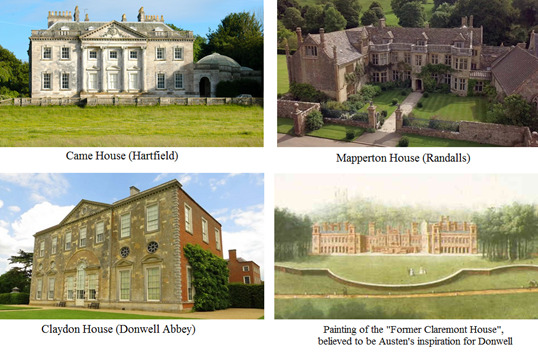
Mapperton House is maybe the grandest house yet used for Mr. Weston’s Randalls (I’ve already covered in my review of Emma (2020) why this is a problem – although in this version, as in the 1997 adaptation, there’s no full panic over the snow, so this is less of a problem, but a house like this is still too grand for the reasonably sized Randalls of the book), but it fits the usual 15th-16th century house type that always seems to be used for Randalls.
A myriad of other great houses were used for interiors, however other than Crichel House (Dorset), which was used for Donwell’s interiors, I can’t find information on which ones where used for what. They include Breakspear House (Harefield), Coker Court (Somerset), Stafford House (Staffordshire) and Syon House & Park (Middlesex).
I really appreciate the interiors which were all very colorful and even included doors and molding painted the same color as the walls which is a very Georgian decorating convention, although it looks odd to the modern viewer.
Costumes & Hair
As a rule, the costumes (Created by Ruth Myers) in this movie are pretty damn good, composition wise, but the arrangement leaves a lot to be desired. Myers talked extensively of wanting the costumes to be colorful and bright like the water colors of the time, which she achieved brilliantly. What I find funny is that she talked about using color as if it would be controversial from a historical accuracy point of view, which couldn’t be further from the truth.
The evening wear is generally excellent
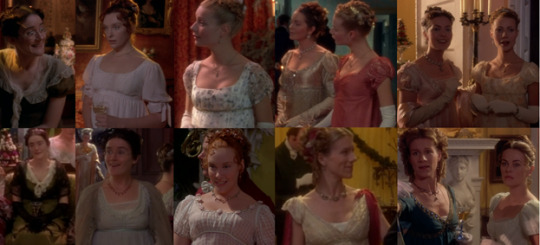
My only question around evening wear here is… what’s up with the waistline on Harriet’s ball gown? Why is it going up in the middle? Toni Collette (who actually gained weight for the role, since Harriet was described as “Reubenesque”) verged on looking a little dumpy throughout the film and awkwardly bumping up her waistline in the middle really didn’t help.
I’m pleased to report that is is the one version where Miss Bates’s evening-wear is allowed to look like evening wear. Even Maiden Aunts wore shorter sleeves and lower necklines at dinner or balls. They fussed her up with some lace gloves and frilly fichus but it follows the conventions of the time. I appreciate that immensely, though I have the sneaking suspicion that it’s because of Sophie Thompson’s age.
At 37 Thompson was an unconventionally young choice for Miss Bates, a character who previously had only been cast as older than 50 (Prunella Scales, who would play the role later in 1996, was 64). Indeed, Douglas McGrath almost passed Thompson over for the role on account of her age, but reconsidered after seeing her in spectacles. It seems possible to me that since Thompson was considered young they dressed her “young” as well.
The daywear is where the costumes start to really fall apart. There are a lot of looks here worn in the day that are VERY not day/outerwear appropriate, especially on Emma, most especially the yellow dress she’s wearing while driving that carriage (which, btw is inappropriate on a whole OTHER level). Can we just talk aboutt he cognative dissonance of bothering to put a bonnet on her when her arms and boobs are just hanging out like that? Like, it would almost have been less egregious to just leave the bonnet where it was.

But then there are a lot of Emma’s day-wear looks that are perfectly suitable and appropriate. What I find ironic about that is that most of the short-sleeved, low-necked “Evening-gowns as day-wear” looks are worn OUTSIDE in the sun and most of the long-sleeved, sun protecting, day-wear appropriate looks are worn INSIDE. She’s also got a profusion of dangling curls in day-time settings that are also more evening-wear appropriate (to match the dresses, perhaps?)
I’m also pleased to report that even in day-wear Miss Bates gets a break from brown in this version. Her clothes are nice, but not fancy like Miranda Hart’s in Emma. 2020, and I like to think that nice thick shawl with lace overlay is the one mentioned in the book that Jane’s friend Mrs. Dixon sent along home with her for her aunt.
My only problem with Mrs. Elton’s kit is that it’s all perfectly nice, but none of it is overly-nice. There’s no extra trim, no unnecessary lace, not even any bold colors. I hope Myers and McGrath didn’t take Mrs. Elton’s line in the book about her fear of being over-trimmed seriously.
Let’s talk outerwear. There’s a lot of going into town with JUST a shawl on in this movie (usually over short sleeves), and I’m sorry but I don’t think that’s how outer-wear worked in this time period. A shawl is good enough when you’re taking a turn in the garden but not for going out in public into town, unless maybe you’re wearing long sleeves, or perhaps paired with a SPENCER.
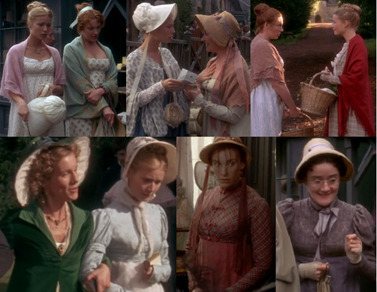
Never mind Mrs. Elton’s line about a shocking lack of satin at the end of the movie, I’m more concerned about the shocking lack of spencers. There are precisely three in this film. I counted (and the sleeves on Emma’s look like maybe they’re too long for her?) Mrs. Elton sports the only redingote in the film.
Jane Fairfax is, as always, in her classic Jane Fairfax Blue™,
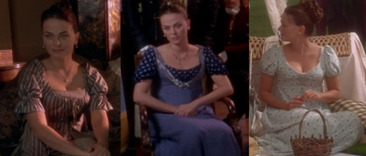
although she has some nice white gowns at some points too.
Now, onto
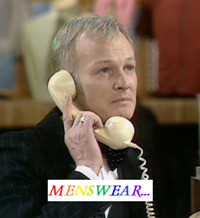
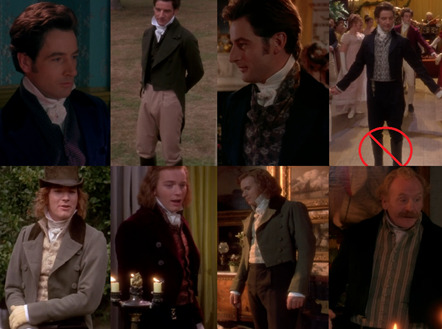
Definitely a bit more colorful than the 97 adaptation. Mr. Knightley benefits most from the addition of colors other than green. He’s even got some smashing waistcoats and a very nice blue evening coat (I couldn’t get very good shots of them though). The problem is; those trousers? NOT. TIGHT. ENOUGH.
Also… you all see it, right? I circled it in red so you should. Yeah. Knightley is dancing in boots. WTF RUTH? Please! You’re better than this! Who dances in Prussians like that? I ask you! (Frank also wears boots to the Cole’s dinner party so that’s two strikes.)
I’m not sold on Frank’s looks. His day-wear is a bit sedate for such a confirmed dandy (I believe he’s called a ��coxcombe” in the book?) and his evening wear… well he apparently only has the one look.
And speaking of Frank’s look in this film, I’d like to know at whose doorstep I should lay the blame for what Ewan McGregor himself has called “The Worst Wig Ever”; and why the hair designer in charge decided to model Frank’s aesthetic on a theme of “Chucky meets the Mad Hatter”.
This hairstyle not only looks dreadful, it’s not at all fashionable or authentic to this time period! Fashionable mens’ hair styles at this point were all relatively short. A Beau Brummel coiffeur, or a short Roman style, or a fashionable head of curls like Mr. Elton’s! Not this farmer chic. Robert Martin’s hair is more fashionable than Frank’s!
The tune they chose for Emma and Knightley’s dance is a baroque melody (so a hundred or so years out of fashion) called “Mr. Beveridge’s Maggot” and as is pointed out in the video linked above, and is the same tune and dance used for Lizzie and Darcy’s big dance in Pride and Prejudice (1995).
I get why it was used in P&P because, slow, stately baroque tunes are often used as on-screen short hand for snobbish character like Mr. Darcy. It’s not super intense either, like the baroque tune used in P&P 05, which was chosen for more romantic effect. So why use this kind of “stuck up” tune for what should be a romantic dance? Maybe because it was used in the 95 P&P which became, almost instantly, one of the most popular Austen adaptations?
Quick note on the dancing and music in this movie. I’m not an expert on English Country dance (I’ll outsource that by giving you the usual link to Tea with Cassiane’s analysis on YouTube) but I’ll add my two cents - I know Cassiane gave this a pretty favorable three full dance slippers but I think the way all of the actors and dancers move looks very poorly rehearsed and kind of sloppy. I think everyone just spread out way too much.
Douglas McGrath’s Script
I have to say one of the things this film did very well and brought to the forefront is how insular Emma’s life is. The opening credit sequence brings this to our attention right away by showing a spinning globe which, once it slows down is shown to be, literally, Emma’s whole tiny world. Hartfield, Donwell, Randalls and Highbury. That’s it. It’s perhaps not a very subtle device, but it does get the job done and very succinctly too.
I would now like to talk about my issues with the script of this movie; I have some problems with it. Very different problems than it’s 1996 counterpart though.
First let’s go over the comedic device that jumped out to me most in this movie: the awkward pause.
I think it’s only used twice but they both bothered me.
First there’s the pauses while Emma and Mrs. Weston grill Knightley on whether he considers Jane Fairfax romantically. It’s all written as very “OoOoOooo” with Knightley answering their interrogations and then sitting between them awkwardly as they stare him down as, none of his answers giving either Emma or Mrs. Weston satisfaction. This is one of the most teen rom-com moments of the film to me.
Next there’s all the quiet stretches while Emma and Mrs. Elton have tea at Hartfield. I don’t like the use of awkward pauses in this case because (as I mentioned in Mrs. Elton’s characterization section) it’s so ludicrous to me that there are pauses in this conversation at all. Surely the point of Mrs. Elton is that she loves to hear herself talk and her conceited obsession with the idea that everyone around her must only benefit from hearing her opinions. There should be no conceivable reason why Emma should have to prompt conversation like she does in McGrath’s version of this scene, except to derail Mrs. Elton’s constant self-important yammering.
Watching it this time around I found myself wondering exactly what McGrath wanted to do with this film. I mean I’ve been attempting to decipher exactly whether the changes made were conscious and based on artistic vision, or whether they were changed because the source material just flew over McGrath’s Hollywood Director head.
I mean he gets the important plot points across, but there were other scenes that I had issues with: namely, the Archery scene. This is a pretty intense part of the book because Mr. Knightly goes from astonished, to indignant, to truly vexed with Emma in a short period of time. But this scene in the movie is very casual. The part where Emma’s arrow goes wide and into the general direction of Knightley’s dogs, and he takes an opportunity to make a quip and says “try not to kill my dogs” particularly annoyed me. My issue is that this totally ruins the tension of the scene; and why are Knightley’s dogs sitting BEHIND THE TARGETS ANYWAY? Knightley is a sensible man, and one who knows better than to let his dogs rest in a place where stray arrows could hit them!
The dialouge is very jarring because it flips back and forth beetween being alright, and period appropriate and then it will just spring a very modern turn of phrase and pull you completely out of the setting. I know this is something that’s been brought up with the 2009 version as well but maybe it’s because the actors in that version have (in my opinion) better chemistry that it simply doesn't stick out to me as much.
The comedy in general in this movie just makes me cringe a lot of the time (Sophie Thompson’s “oh sorry, napkin” bit notwithstanding). Like the soup thing when Emma and Harriet meet Mr. Elton after visiting the poor, and the random kid that gets tossed into this scene with Emma… just doesn’t work for me.
Wikipedia describes McGrath’s tweaks on Emma and Knightley’s banter (which really weren’t changed that much, textually) as “Enlivened” to make the basis of their attraction more apparent, which… I’m sorry but nothing about the exisiting banter isn’t lively if delivered in a lively manner. And I wouldn’t exactly call Gywneth’s performance lively, because she has to concentrate to keep that accent up.
I mentioned already that what McGrath essentially did with Emma was take Austen’s story, and remove the nuance (Such as lightening Frank’s infractions in his relationship with Jane and, while not totally contradicting, but also not highlighting the economic commentary of the story that is thematic in Austen’s novel) in order to make a straight up 90’s comedic romance film (Which, if you doubt this, look no further than Rachel Portman’s Oscar Winning but very dated score).
My Question is why? Why bother when the SAME STORY had been adapted into a HIGHLY SUCCESSFUL, modernized rom-com THE PREVIOUS YEAR, which actually, even while being set in the 90’s, did the story greater justice, with far more insight and quality?
Emma (1996) was always going to be over-shadowed by Clueless. At the end of the day this whole movie was kind of a futile effort because despite excellent production quality, the actual contents are watered down and, in my own opinion, pretty roundly mediocre.
Final Thoughts
When I first watched both of these versions I came at it from a very one-or-the-other perspective. I forgave McGrath’s film because it was light and colorful and I’d heard Davies’ version praised so highly at that time as the only faithful, definitive version (only to be let down by it in almost every possible way). But coming right down to it now, it’s hard for me to really excuse McGrath’s effort because a version of Emma that doesn’t take itself seriously enough is almost as bad as a version that takes itself too seriously.
It never fails to jump out at me how diametrically opposed these interpretations are, from the characterization right down to the tone and lighting.
McGrath’s Emma is light in every sense of the word, where Davies’ is dark and ponderous. McGrath’s Knightley is laid back where Davies’ is aggressive and ferocious. Frank, in McGrath’s version, is let off easy by the narrative playing down his moodiness, while in Davies there’s an overshadowing dark-cloud of off-putting caddishness.
Ribbon Rating: Tolerable (58 Ribbons)
The more I watch the 1996 adaptations of Emma (invariably back-to-back) the more firmly I am convinced that Andrew Davies’ made for TV film was (in some ways) a direct response to McGrath’s motion picture.
Tone: 7
Casting: 7
Acting: 5
Scripting: 5
Pacing: 4
Cinematography: 4
Setting: 5
Costumes: 6
Music: 5
Book Accuracy: 6
18 notes
·
View notes